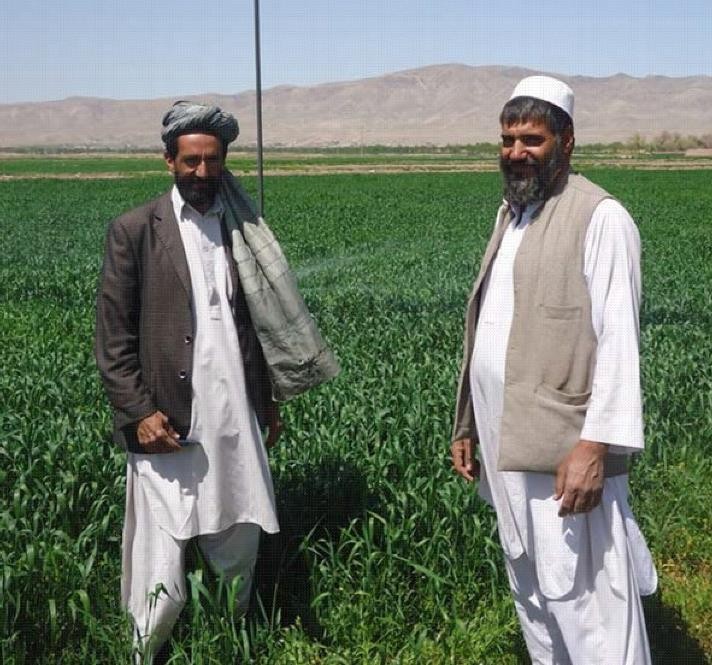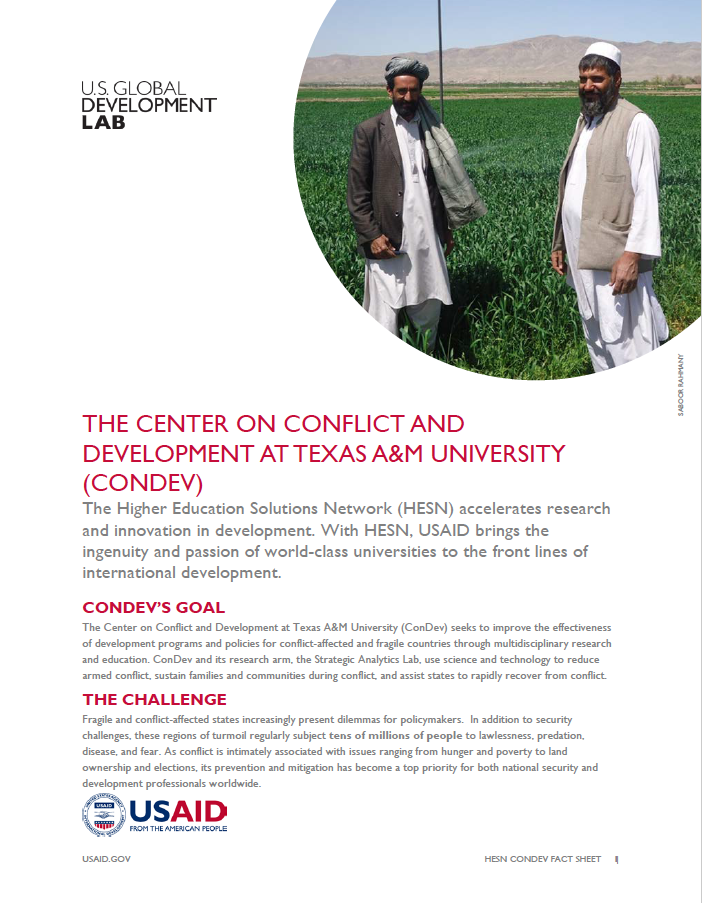- What We Do
- Agriculture and Food Security
- Democracy, Human Rights and Governance
- Economic Growth and Trade
- Education
- Ending Extreme Poverty
- Environment and Global Climate Change
- Gender Equality and Women's Empowerment
- Global Health
- Water and Sanitation
- Working in Crises and Conflict
- U.S. Global Development Lab

ConDev's Goal
The Center on Conflict and Development at Texas A&M University (ConDev) seeks to improve the effectiveness of development programs and policies for conflict-affected and fragile countries through multidisciplinary research and education. ConDev and its research arm, the Strategic Analytics Lab, use science and technology to reduce armed conflict, sustain families and communities during conflict, and assist states to rapidly recover from conflict.
ConDev's Challenge
Fragile and conflict-affected states increasingly present dilemmas for policymakers. In addition to security challenges, these regions of turmoil regularly subject tens of millions of people to lawlessness, predation, disease, and fear. As conflict is intimately associated with issues ranging from hunger and poverty to land ownership and elections, its prevention and mitigation has become a top priority for both national security and development professionals worldwide.
ConDev's Innovative Approach
U.S. and multilateral institutions are increasingly called upon to operate in conflict environments, yet policymakers are often ill-equipped to resolve dilemmas related to state-building and reconstruction. Our approach prioritizes RESEARCH, INNOVATION, and the CREATION of a GLOBAL NETWORK capable of addressing these critical issues through evidence-based strategies and policies.
As part of HESN, ConDev harnesses the power and resources of Texas A&M University, the Howard G. Buffett Foundation (HGBF), USAID’s Global Development Lab, and other partner institutions to produce TRANSFORMATIVE SOLUTIONS to overcome the negative impacts of conflict that preclude broad-based development.
Based upon an agreement with its partners, ConDev’s research, education and extension is focused largely on mitigating conflict related to four key questions:
- FOOD SECURITY - Which interventions are required to build upon local conflict coping strategies to incentivize food security and promote resilience?
- NATURAL RESOURCE MANAGEMENT - How can natural resource management be used as a peace-building approach?
- YOUTH POPULATIONS - What investments are required to engage conflict-vulnerable youth populations through workforce development linked to jobs?
- LOCAL INSTITUTIONS - How do legitimate local institutions redirect elite competition and promote cooperation dynamics in conflict-prone regions?
Select Initiatives
- STUDENT ENGAGEMENT. ConDev facilitates interdisciplinary collaboration between faculty and students from 16 schools and colleges at Texas A&M—encouraging students to hone in on the links between conflict and development assistance through high-impact overseas internships, courses led by hardy field professionals, collaborative on-campus competitions, and hands-on international research opportunities.
- CONGO PEACE CENTER. ConDev founded the Congo Peace Center (CPC) in the turbulent region of North Kivu, Democratic Republic of the Congo (DRC) to support sustainable peace in the DRC and facilitate its integration into a more stables and peaceful Great Lakes region. In addition to constructing an auditorium for peace building activities in North Kivu, the CPC is also working to create a local Network of Scholars.
- STUDENT MEDIA GRANT. This HGBF-funded photojournalism grant enables students to highlight issues in fragile and conflict-affected states through stunning photography. Just this past year, grantees journeyed around the world to share the stories of Boko Haram victims living in Nigerian IDP camps, chronicle the lives of rural women trying to feed their families in Haiti, and draw attention to other critical issues in Bangaldesh, Peru, Kenya and India.
- RESULTS-BASED RESEARCH. Besides ameliorating conflict through field programs, ConDev also conducts strenuous research. While its students and partners generate reports and presentations, the Center’s Strategic Analytics Laboratory focuses on tackling the more theoretical, data-intensive aspects of conflict research. Together, they delve into the relationships between conflict and development to better inform policy and development assistance. Right now, more than 15 USAID field missions and bureaus are using ConDev-generated data analyses and policy briefs.
Partners
Texas A&M University's College of Agriculture and Life Sciences, Bush School of Government and Public Service, School of Public Health, and College of Liberal Arts; Howard G. Buffett Foundation; Conflict and Development Foundation; Catholic University of Graben, DRC; and Trimble Navigation.
For more information
condevcenter.org • facebook.com/ConDevCenter • @ConDevCenter
The Higher Education Solutions Network (HESN) accelerates research and innovation in development. With HESN, USAID brings the ingenuity and passion of world-class universities to the front lines of international development. Since 2012, HESN has supported Development Labs at seven universities that engage students, researchers, faculty, and their partners in innovating scientific and technological approaches to the world's most challenging development problems. By evaluating and field-testing approaches in partnership with local institutions, HESN Development Labs identify solutions that are efficient, cost-effective, accessible, and sustainable, then strategize how to apply them on a large scale. With funding over five years from USAID and matching investments from the universities, the HESN network has grown into a vibrant collaboration among more than 650 partner institutions in academia, civil society, and government in more than 65 countries.








Comment
Make a general inquiry or suggest an improvement.